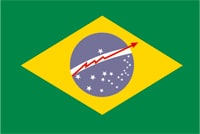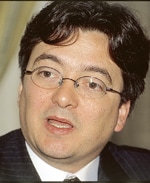In late November a group of executives from the top Brazilian companies visited New York City in order to bring their message direct to Wall Street. They wanted to show investors that Brazil has great potential.

Corporate financial executives are still feeling the heat when it comes to anteing up extra money to keep their defined benefit pension plans properly funded.
The honeymoon period may be long past for the Brazilian presidency of Luiz Inacio da Silva (Lula), but Brazilian executives are optimistic that the economic uptick achieved during the past year will continue in 2004.
While acknowledging impediments such as high interest rates, an aging infrastructure system and a complicated tax structure, corporate executives say Lulas administration has gained the confidence of the general public as well as investors during its first year in power.
The year 2003 was an adjustment year, when all the ghosts that were frightening the population disappearednegative expectations to inflation, debt defaults or radical decisions, says Luiz Gonzaga Murat Jr., chief financial officer of Sadia, Brazils largest poultry processing company. The PT [Workers Party] government is working in a very pragmatic way, and confidence in Brazil was re-established. Murat was one of nearly two dozen Brazilian executives participating in Brazil Day, a conference held in New York City in November for financial analysts, investors and other businesspeople interested in the investment climate in South Americas largest economy.
While always popular among the general population for his commitment to social reforms, the left-leaning leader of Brazils Workers Party had many international and domestic investors worried after his successful October 2002 election. But Lula has soothed the nerves of the business community since assuming power in January 2003 by taking steps to improve the countrys fiscal and economic health.
For business executives attending Brazil Day, the administrations progress in pension reform, in handing the central bank more autonomy, and facilitating declines in interest rates and inflation are all examples of its commitment to stabilizing the economy.
Jose Luiz Acar Pedro, executive vice president and investor relations director at Banco Bradesco, says Lulas administration has achieved a balance in the economy: Interest rates were kept at high levels in the beginning of the administration in order to fight against inflationary pressures. The remedy was successful, and the inflation rate is under control according to the governments goals, says Acar. Additionally, conditions for the long-term sustained growth of the Brazilian economy have been put in place, generating a reduction in unemployment levels and an improvement in income levels.
High interest rates are frequently cited as an obstacle that Brazilian companiesespecially small and mid-size businesses without easy access to international capital marketsencounter when trying to run and expand their operations.
The cost of capital is a problem, says Joao Cox, president of Telemig Celular and Amazonia Celular, two cellular companies based in Belo Horizonte. Thats inefficient for Brazilian companies and will be a problem for them as they compete with other companies from around the world. He adds that even good creditors have to pay 20% annual interest.
Osvaldo B. Schirmer, executive vice president and chief financial officer at Brazilian steelmaker Gerdau, adds, Theres room for further decreases, but the central bank has been prudent in reducing interest rates in pieces.
During meetings in New York, several business leaders agreed that the upgrades in Brazils sovereign ratings by international rating agencies last year should ease Brazilian corporations ability to raise funds in the international capital markets. Acar noted that Brazils improving risk profile will help Brazilian companies raise money in the future through bond issues.
 |
|
|
Export Growth Continues
Another bright spot in the Brazilian economy has been the growth in exports. While still a small portion of a huge economy, the trade surplus has provided the Latin nation with much-needed hard currency to help pay down its foreign debt.
At the conference, Brazilian Minister of Development, Industry and Trade Luiz Fernando Furlan estimated that Brazil would register a trade surplus of $23 billion in 2003 as exports tallied $70 billion for the year. Brazilian trade officials recorded a trade surplus of $13.1 billion in 2002. But we need exports to grow by 14% to 15% a year, said Furlan, who added that the Brazilian government is working on several fronts to help improve the business climate for corporations operating in Brazil.
One primary goal is to reduce bureaucracy by simplifying the countrys complex tax structure and reducing the tax burden on exporters. Another is to upgrade the countrys deteriorating infrastructureincluding highways, railroads and portsin order to boost trade with neighboring South American countries as well as nations overseas.
Furlan said the administration is also intent on helping Brazilian corporations expand their presence in the international marketplace. Trade officials are doing this by diversifying the countrys export markets with an aggressive export promotion program and following a foreign trade policy that favors free trade and market access. There is no country in the developed world without first-class companies, Furlan said. By the end of the Lulas first term, we want to have dozens of such companies.

|
|
|
Many corporate executives support trade officials efforts to promote free trade. Negotiations for the FTAA [Free Trade Area of the Americas], Mercosur [Southern Cone Common market] and with the EU [European Union] will have positive outcomes for Brazil, but the country will also have to make concessions to its partners, says Murat. The terms that Brazilian authorities are proposing tend to target a win-win long-term relationship.
Corporate governance is another topic garnering increased attention in Brazil, and many Brazilian executives strongly support the countrys shift toward stronger corporate governance regulations. They view the stricter regulations as another vehicle Brazilian companies can use to strengthen their competitive position. Corporate governance is very important. It provides more transparency and visibility for the investor, says Schirmer.
Jose Marcos Treiger, investor relations officer at the Brazilian petrochemical giant Braskem, says about 250 financial analysts and executives attended the one-day conference. The group is considering holding a similar conference in Europe this spring.
We picked the right time for the event, considering that all major variables associated with the Brazilian economy indicate that 2004 has the potential of being a much better year for our country and possibly the beginning of a growth cycle, which is long overdue, Treiger says.
Paula L. Green



